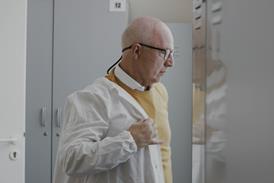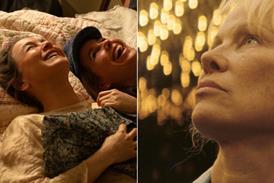A film made in 1949 inspires more than $1.1m in ticket sales in a six-week London run — no wonder the industry is paying more attention to Secret Cinema. Wendy Mitchell talks to Future Cinema founder Fabien Riggall.
Speciality releasing in the UK is always tricky — even Cannes prize-winner Melancholia, by Lars von Trier, did not crack $1m. Yet Secret Cinema sold tickets totalling $950,000 (£600,000) for a library title whose audience members were not told in advance what they were seeing (it turned out to be Carol Reed’s 1949 The Third Man).
Secret Cinema is an amalgam of screening, fancy-dress party, interactive theatre and club night. The Third Man was the 17th and largest Secret Cinema offering in the UK, recreating in Clerkenwell, east London, locations such as the Casanova jazz club, police headquarters and a penicillin lab, allowing viewers to immerse themselves in the film’s world. There was also a Secret Restaurant in partnership with gastronomic landmark St John, and a store with partner Victorinox.
There is risk and big investment involved up front — The Third Man cost around $730,000 (£460,000) to stage. But it attracted 19,000 dedicated audience members in the six-week run in December and January. Secret Cinema founder Fabien Riggall says: “This audience is so loyal and committed to the idea of helping us create this world.
“Distributors are starting to see it, and starting to understand we took more money than Melancholia or Wuthering Heights,” Riggall notes. Parent company Future Cinema has already worked with the likes of Paramount to create high-profile concepts for the Watchmen launch, and more distributors are talking to Future Cinema about how they can create events around their own releases.
The Short answer
Riggall had worked in several entry-level film jobs before launching Future Shorts, which led to Future Cinema and Secret Cinema, in 2003. He had produced Jamie Rafn’s short She Loves Me, She Loves Me Not, and found the festival application process very distancing from audiences. Future Shorts launched that year with a short-film night in a club in Shepherds Bush Green, west London. He remembers: “People were talking passionately after the films, and that was the idea of social cinema, or a film festival that appeals to a slightly different audience.”
Nine years later Future Shorts is still going strong, offering the Future Shorts Festival as a quarterly package of films that can be shown at arts venues, cinemas or in living rooms. Since it was restructured in 2011, the festival runs in 150 global cities, including the likes of Kabul, with audiences of more than 25,000. Participating film-makers receive a one-off payment — typically around $670 (€500) — for the three-month license, and also a cut of the licenses sold to screening hosts (fees are scaled by the size of audience).
Future Shorts also offers shorts to view online and through commercial distribution deals with broadcasters, airlines and internet platforms.
Umbrella company Future Cinema also runs Secret Cinema and The Other Cinema, which will screen one film per month in non-traditional local venues. The company has 10 full-time staff, swelling to 150 during a Secret Cinema production.
Early Secret Cinema hits included The Warriors, Alien and Blade Runner. In summer 2011, the California tourism board enlisted Future Cinema to recreate California in London with screenings of Top Gun and The Lost Boys. The company tested the waters in New York in 2010 with a screening of Blow-Up, and expects further projects in the US soon. This spring, the company will launch Secret Screenings, working with distributors to offer “the ultimate preview screenings” to build word of mouth. “You get that audience to start Tweeting and sharing, and then when it comes to the first weekend, you can show that to the exhibitors,” Riggall says.
Growth plans include attracting investment to build the company’s own platform — its YouTube channel already has 3 million views per month. Other ideas could see events travel abroad: “You could say the next Secret Cinema event will take place on this date, bring your passport, you’ll be away for four days,” suggests Riggall.
Brands are also key to the company’s success. Future Cinema created a bespoke bachelor-pad party at Cannes 2011 for Stella Artois, and the company has worked with brands including Nokia, Samsung, Microsoft and Mini.
“The way I see it in the future is that we will create worlds on behalf of brands, on the commercial side of the business. We can work with tourist boards or fashion houses or music labels; you can build amazing, immersive worlds.”
Fabien Riggall
- Trained at the New York Film Academy.
- Worked on projects with Homerun Productions, IOM Films, Zephyr Films, 2AM Films and Rogue Films and produced 2003 short film She Loves Me, She Loves Me Not.
- Founded Future Shorts in 2003 and Secret Cinema in 2007.
- Launched The Other Cinema in February 2012 and will launch Secret Screenings in the spring.






















1 Readers' comment